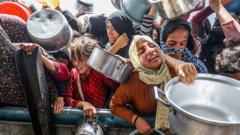In an alarming report, the UN warns of a looming humanitarian disaster in Gaza, where a blockade by Israel is causing widespread starvation and suffering among civilians, particularly children.
Israel's Food Blockade: A Weapon of War, Says UN Official

Israel's Food Blockade: A Weapon of War, Says UN Official
The head of the UN Palestinian refugee agency labels Israel's denial of food to Gaza civilians as a weapon of war in a recent BBC interview.
The ongoing conflict in Gaza has plunged its population into a dire humanitarian crisis, with the UN stating that millions face acute food insecurity and starvation as Israel maintains a strict blockade. Philippe Lazzarini, the commissioner-general of the United Nations Relief and Works Agency (UNRWA), highlighted the escalating desperation, stating that the situation amounts to the "weaponisation of humanitarian aid." With more than two months without aid due to Israeli restrictions, Lazzarini has described the conditions as catastrophic, predicting that starvation will lead to more deaths than the conflict itself.
The blockade, in place before the recent hostilities resumed in March, has blocked all humanitarian supplies, including food and medicine, leaving over two million Gazans in a precarious situation. Current reports from the Integrated Food Security Phase Classification indicate that nearly half the population, particularly children, are experiencing severe food shortages, with a significant portion classified as being in a "Phase 5 - catastrophe" state.
Lazzarini has unequivocally stated that Israel's actions constitute a war crime, linking the blockade to political and military objectives. The growing evidence of human suffering raises serious concerns about potential genocidal actions, as accusations of systematic atrocities against the Palestinian population grow amidst the ongoing conflict.
The situation is further complicated by Israeli political dynamics, where leaders, including Prime Minister Benjamin Netanyahu, face pressure from ultra-nationalist factions to sustain military operations in Gaza. This political calculus is playing out even against the backdrop of hostage negotiations and international condemnation.
Despite accountability efforts, Israeli officials have continually dismissed accusations against the state and the UNRWA, claiming that humanitarian aid is exploited by Hamas. Yet, Lazzarini maintains that Unrwa operates transparently and responsibly in the face of such allegations.
As the international community remains largely passive in addressing these unfolding events, Lazzarini warns of the long-term repercussions of inaction, with the potential for historical judgment of complicity in the face of massive humanitarian atrocities being faced by Gazans. The future remains grim, with escalating violence and humanitarian needs clashing amidst ongoing military strategies that seem to prioritize territorial control over civilian welfare.
The blockade, in place before the recent hostilities resumed in March, has blocked all humanitarian supplies, including food and medicine, leaving over two million Gazans in a precarious situation. Current reports from the Integrated Food Security Phase Classification indicate that nearly half the population, particularly children, are experiencing severe food shortages, with a significant portion classified as being in a "Phase 5 - catastrophe" state.
Lazzarini has unequivocally stated that Israel's actions constitute a war crime, linking the blockade to political and military objectives. The growing evidence of human suffering raises serious concerns about potential genocidal actions, as accusations of systematic atrocities against the Palestinian population grow amidst the ongoing conflict.
The situation is further complicated by Israeli political dynamics, where leaders, including Prime Minister Benjamin Netanyahu, face pressure from ultra-nationalist factions to sustain military operations in Gaza. This political calculus is playing out even against the backdrop of hostage negotiations and international condemnation.
Despite accountability efforts, Israeli officials have continually dismissed accusations against the state and the UNRWA, claiming that humanitarian aid is exploited by Hamas. Yet, Lazzarini maintains that Unrwa operates transparently and responsibly in the face of such allegations.
As the international community remains largely passive in addressing these unfolding events, Lazzarini warns of the long-term repercussions of inaction, with the potential for historical judgment of complicity in the face of massive humanitarian atrocities being faced by Gazans. The future remains grim, with escalating violence and humanitarian needs clashing amidst ongoing military strategies that seem to prioritize territorial control over civilian welfare.


















